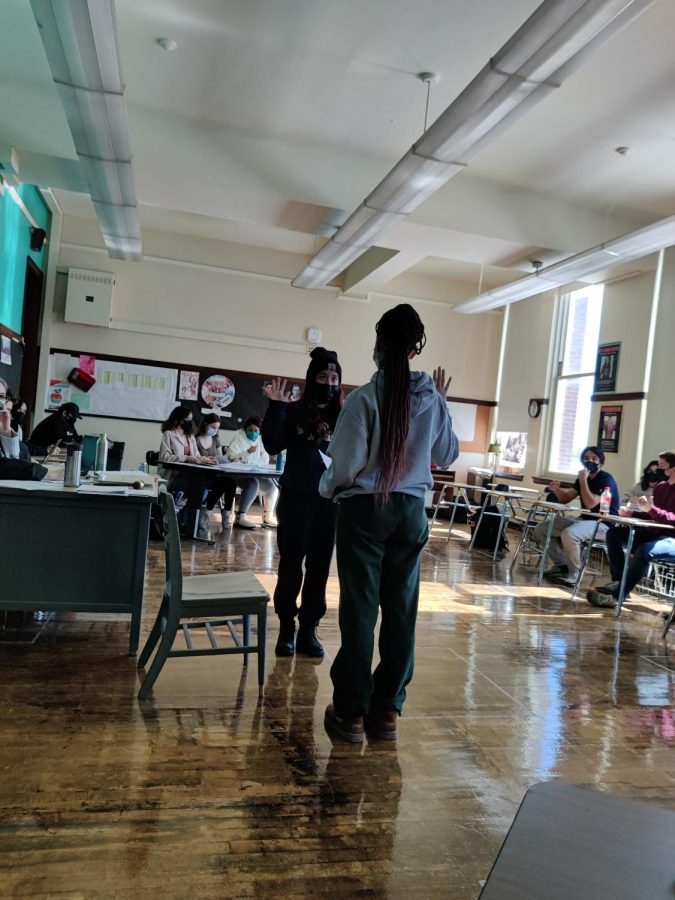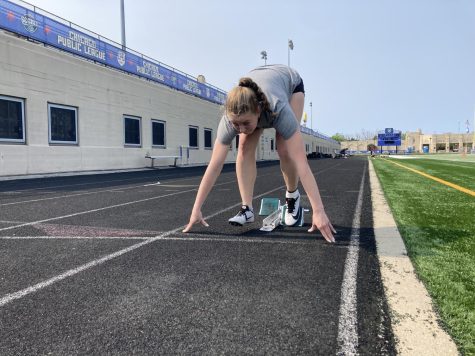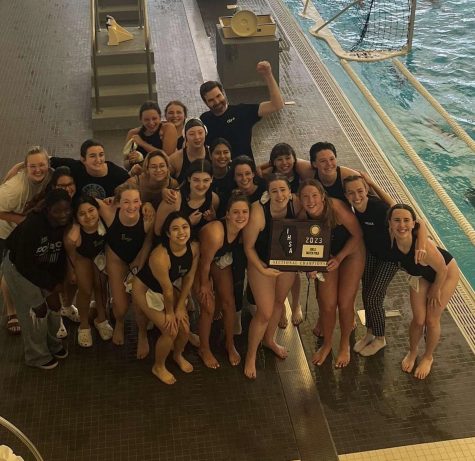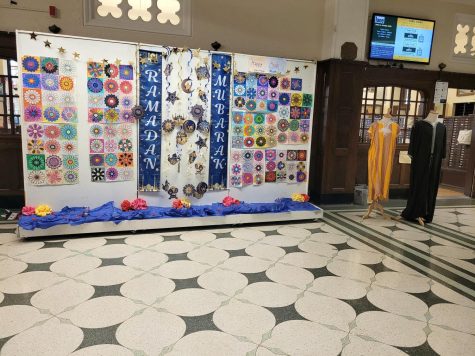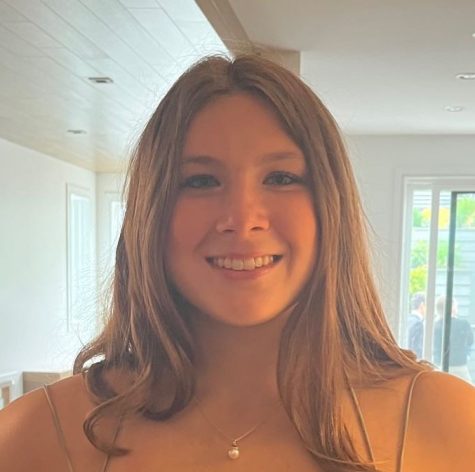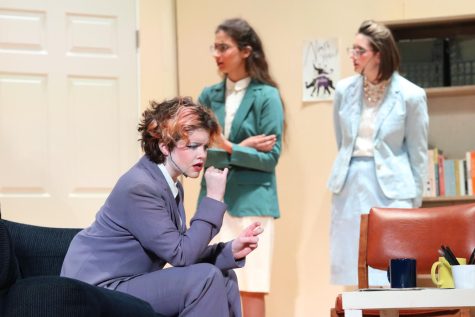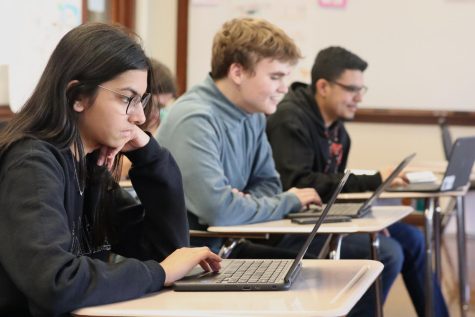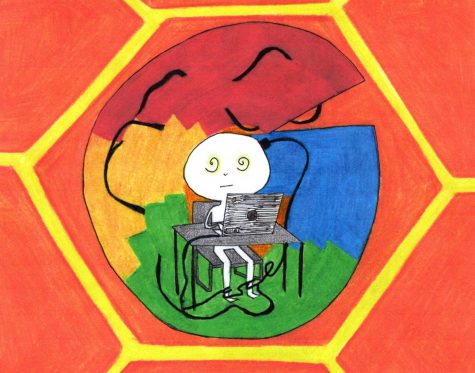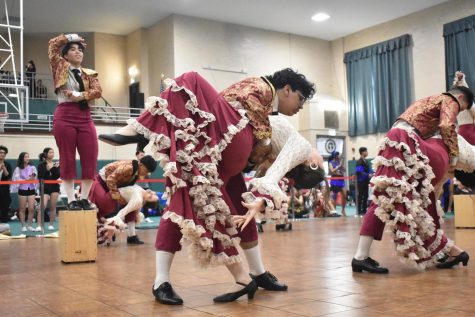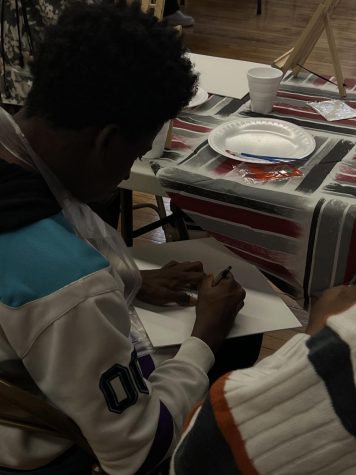Law class students put legal procedures in play through mock trial
Camilla Hartwick’s friend, a witness in the trial, testifies to the jury that she will speak only the truth.
April 1, 2022
The resounding silence stretched across the designated courtroom as the black-robed judge, Susan Sebestyen, lifted the gavel. She struck it and solemnly announced: “Court is adjourned.”
On Tuesday, Feb. 22, 2022, defendant Mikaila Kennedy’s fate was decided in the case People v. Kennedy. In an 11-2 mistrial by the jury, she was surmised innocent. This mock trial was the formative assessment for Lane Tech’s 5th period Honors Law Class, in Room 258.
In Honors Law, all students participate in the mock trial – either as a lawyer, witness or jury member. The students who act as lawyers select which case, which are solely fictional, they want to enact. After choosing a side, they look through the case packet, which contains the witnesses’ statements and evidence. Those playing the role of a lawyer or witness play the jury in the next trial and vice versa.
Typically, they are given a script for the trial. However, this mock trial was different. This was the first time the students wrote their own script and presented it.
Savannah Brown, Andrew Kamlet and Sophie Stein were on the defense team, while Tattiana Jenkins, Leilani Collado and Anna Szwajnos were on the prosecution team.
This particular trial was brought forth by the mother of the deceased, Camilla Hartwick, who had died by committing suicide. Hartwick was depressed before moving to Chicago, where she transferred to a new school. There, she was bullied by student Mikaila Kennedy.
Defense lawyer Savannah Brown stated that “…this case is to see if the prosecution approved if our defendant was criminally negligent of the death of their client’s daughter.” To be criminally negligent is to recklessly perform an act that poses harm to someone else, all while knowing the risk of it.
The prosecution approached the case by saying that Kennedy’s actions were criminally negligent. Their standpoint was that Kennedy knew what she was doing. Hartwick stopped self-harming before meeting Kennedy, and the suicide happened when Hartwick’s depression lapsed as a result of Kennedy’s bullying.
“Kennedy fostered an environment of bullying at Ulysses S. Grant High School,” prosecutor Szwajnos said. “Camila felt victimized and alone, leading her to end her life.”
On the other hand, the defense’s goal was to make sure Kennedy didn’t get any convictions. They believed that Kennedy shouldn’t be held accountable for Hartwick’s suicide.
“We think she’s innocent. It’s not her fault that the person [Camilla Hartwick] killed herself,” defense attorney Kamlet said.
The prosecution’s evidence consisted of the school’s anti-bullying policy and a hate page on the (fictional) website Faceplace. Their witnesses announced that Mikaila negatively influenced Camilla, who was finally recovering from depression. According to them, Kennedy led the bullying.
The defense’s witnesses expressed that they didn’t have a lot of interaction with Hartwick. All they knew about her was rumors, such as circulating one claiming that she was a “crazy cutter.” Hartwick’s teacher stated that she had never seen her outside of class. She also mentioned that Kennedy was social, while Hartwick never participated in class.
In Mikaila Kennedy’s testimony, Kennedy admitted that she bullied Hartwick because she got together with her ex-boyfriend Tim Maguire. Kennedy stressed that she felt bad for bullying her and was unaware of Hartwick’s previous mental struggles. Kennedy (acted by Kira Smith) alleged that she “had nothing to do with Camilla’s death.” She believed that Hartwick’s depression was the cause of her suicide.
In the closing statements, both the prosecution and defense reviewed their arguments in order to refresh the jury. The prosecution had to showcase that their case proved “beyond a reasonable doubt” and display Kennedy’s criminal negligence, while the defense had to prove that the prosecution didn’t fulfill all of the criminal negligence checkpoints.
Out of the jurors, eleven voted Kennedy to be guilty, while two voted to be not guilty. One juror expressed that they voted Kennedy to be guilty due to the “recklessness” of Kennedy’s actions and the “obviously menacing comments” written on the Facepage. Some jurors voted not guilty due to insufficient evidence. The trial was a mistrial, as it wasn’t a unanimous vote.
Excluding the judge, who was played by Law class teacher Sebestyen, this mock trial was entirely enacted by students.
“It’s nerve wracking at first, but once you’re up there, I feel like I become a different person and it’s like I’m actually taking on the role — being a lawyer — and it makes me feel more confident,” Collado said.
Both Collado and Szwajnos agreed on this feeling.
“Once you’re up there, it completely changes,” Szwajnos said.

